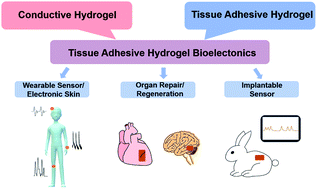Tissue adhesive hydrogel bioelectronics
Abstract
Flexible bioelectronics have promising applications in electronic skin, wearable devices, biomedical electronics, etc. Hydrogels have unique advantages for bioelectronics due to their tissue-like mechanical properties and excellent biocompatibility. Particularly, conductive and tissue adhesive hydrogels can self-adhere to bio-tissues and have great potential in implantable wearable bioelectronics. This review focuses on the recent progress in tissue adhesive hydrogel bioelectronics, including the mechanism and preparation of tissue adhesive hydrogels, the fabrication strategies of conductive hydrogels, and tissue adhesive hydrogel bioelectronics and applications. Some perspectives on tissue adhesive hydrogel bioelectronics are provided at the end of the review.

- This article is part of the themed collection: Journal of Materials Chemistry B Lunar New Year collection 2022


 Please wait while we load your content...
Please wait while we load your content...